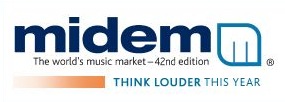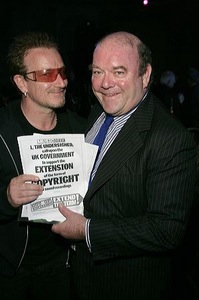 U2’s longtime manager Paul McGuinness, a man highly respected in the recording industry, got his speech today at Midem ass backwards.
U2’s longtime manager Paul McGuinness, a man highly respected in the recording industry, got his speech today at Midem ass backwards.
He called for Internet service providers (ISPs), telecom companies, and hardware manufacturers to help in the fight against music piracy on the Web. That’s good.
But then he said, “I suggest we shift the focus of moral pressure away from the individual P2P file thief and on to the multibillion dollar industries that benefit from these countless tiny crimes.”
No matter what I think of Microsoft, Google, AOL, Yahoo, Comcast, Vodafone, Facebook, and Apple, it doesn’t seem to me that they are at fault for the recording industry’s woes. Yet McGuinness rubs their noses in it, saying “their snouts have been at our trough feeding for free for too long.” (Financial Times account.)
 Yes, these companies have made boatloads of money off the recording industry, but it seems to me that they are not the enemy but rather a part of the solution.
Yes, these companies have made boatloads of money off the recording industry, but it seems to me that they are not the enemy but rather a part of the solution.
McGuinness should be rallying the recording industry first, and oh by the way one scenario, a different way to look at the problem, involves the ISPs, telecos, and device-makers. Let’s all get together and explore the possibilities.
Instead, McGuinness cast aspersions on those who could work with the recording industry and possibly bring about profound change. “We must shame them into wanting to help us,” he said.
Shame is such a strong word. It implies that the recording industry is doing things right, while others are not. If anybody should be shamed, it’s the mixed-up recording industry who has made a royal mess of its own house, failing to recognize and accept that these are new digital times, with quickly-evolving technologies and cultural behaviors.
While it’s good that McGuinness suggests that the recording industry shift its focus away from suing small-fry P2P downloaders, concentrating on the ISPs, telecos, and device-makers like they are part of the problem, not the solution, is misguided.
“Network operators should take responsibility for the content they’ve profited on for years,” he said.
McGuinness said his business model of the future is one where music is bundled into an ISP or other subscription services and revenues are shared between the distributor and the content owners.
Invoking the ISPs, telecos, and hardware manufacturers into the solution is not a new. It’s an idea, known in some forms as a “compulsory licensing tax”, that has been around for a few years. One scenario is to collect money from ISPs, telecos, and device manufacturers into a pool, then split the pot evenly among the artists and writers, recording labels and others in the industry.
The pool of money comes from a small tax levied by the ISP or teleco (say $6 a month) for unlimited access to music from the major and independent recording labels. Device-makers like Apple and Microsoft add to the purchase price of an iPod or Zune, respectively, a small fee or tax that’s paid to the recording industry for the right to sell music players that piggyback on their content.
“This ‘content’ tax seems like a reasonable solution to the current, rather ridiculous environment in which each piece of music must be individually licensed, from each rights owner, on a track-by-track basis,” Gerd Leonhard and David Kusek wrote in their 2005 book “The Future of Music.” “We believe that charging for music at the primary point of access, rather than in every single instance, is a powerful concept,” they wrote. (See also last100’s Music industry: five alternative business models).
In this scenario, the ISPs, telecos, and device-makers are a part of the solution, not the problem.
Photo credit of McGuinness, U2 leader Bono: u2station.com

great post – couldn’t agree more. I was at this speech, here at midem, and was dismayed and quite discouraged by what he was saying. Forcing people into more control because you don’t want to change an outmoded business model is utterly ridiculous and proves that he does not have a clue on what is actually happening out in the REAL WORLD. He should stop ask for protection and punishments and put his vote solidly behind the concept of a new collective digital music license instant of pleasing the RIAA and IFPI with his ‘more control now’ pitch. If you want to read more about how this new license would work read http://www.endofcontrol.com/2007/10/chapter-4-the-f.html or watch my videos at http://www.futuretalks.com
What Paul McGuinness really is saying is a voice for all of the artists out there, not a greedy money grubber.
As a professional composer and performer who isnt in the top 1% of success and MTV rock monsters I am THRILLED that someone with clout is making these issues be vocalized. Its not the U2s and the Mettalicas that suffer, its the indie artists, score composers, and working musicians that are being destroyed by the wide open not even attempted at regulating illegal downloading of all kinds of media, including music, song & albums, films, art, scores, etc
Thank you Mr. McGuinness for bothering to talk about the issues that are a nuisance to you but are life threatening to thousands of us!
I also was a dot com boom programmer and I was an original pre-IPO member of InfoSpace and I understand the tech side very much. I will say that what happened is a natural evolution of technology and human nature. Clicking on files and getting that intellectual property of another person was SO EASY and since it was just digital it felt to have to real value. But we all listened to those MP3s and watched those quicktime movies. And we LOVED the fact that we could stuff a 200 gig firewire drive to the brim with all the music we ever wanted to listen to and not pay a dime. If you didnt do it on some level you are probably either a priest or someone without internet
And so Mr McGuinness is saying lets not blame individuals and human nature, but something MUST be done about this and soon before we lose many facets of modern art and culture to the destabilizing and deflation of its economy.
Its no joke and its not like yea yea whatever, its like EMERGENCY *DINGDINGDING* EMERGENCY. Right now the AFM (musicians union) performance fund (which is the fun for retirement and emergency funding for professional musicians) is about to die, because it is based on CD sales. There are *countless* programs similar to this that are dead or dying quickly because of illegal downloads.
Certainly non-“mainstream pop” art forms like non-synthesizer orchestral film music, among many others are going to become extinct and then fade away completely the farther this goes without being checked.
There absolutely needs to be legislation that forces ISPs and tech companies to create technology to stop non-paid-for illegal downloading of music, film and art. This would be relatively very easy to create. All it needs is ubiquitous agreement and cooperation from all sources that host and transmit data.
Without it our world is going to become a shallow grey world without culture and professional art. That is a place I don’t want to live in.
I just posted my complete reply to Paul’s speech here: http://www.mediafuturist.com/2008/02/welcome-to-paul.html
I guess I just couldn’t resist – there is just too much bizarre stuff in this speech. Cheers, Gerd Leonhard (Music & Media Futurist, Author of “Music2.0)